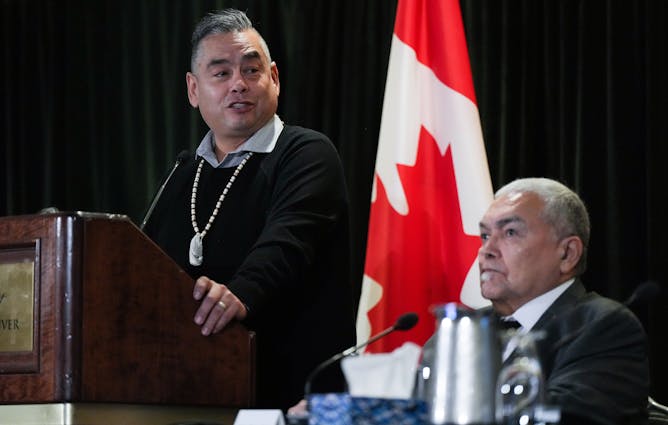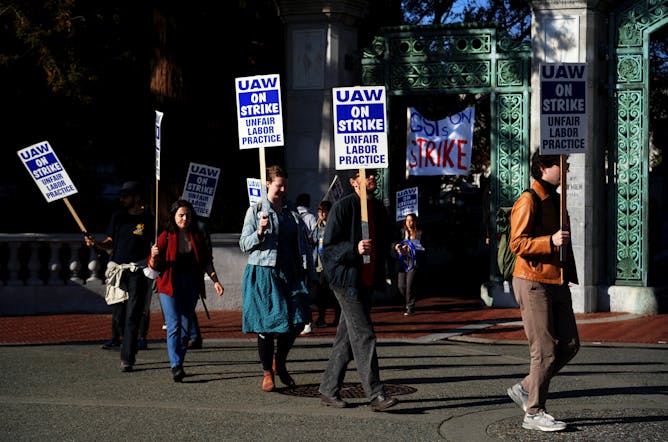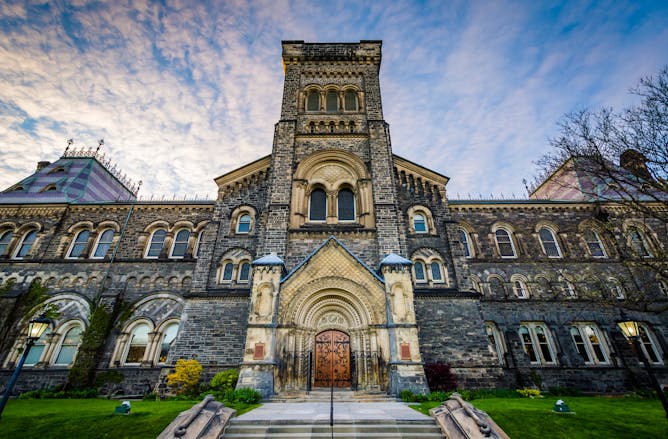|
Last week, the Canadian government agreed to a $2.8 billion settlement with 325 First Nations. The agreement brings to an end the 11-year-long legal battle over the collective loss of language and culture suffered by Day Scholars in Canada’s Residential School system.
In 2012, members of the Tk'emlúps te Secwépemc and shíshálh Nation launched a national class-action lawsuit for Day Scholars who were left out of the original Indian Residential School Settlement Agreement in 2006.
Today, in The Conversation Canada, Jackson Pind from Trent University analyzes what the settlement means for Indigenous communities. As Pind notes, “each agreement has been earned through the dedication of survivors to fight these battles through court, not the generosity of the Canadian state.”
Also today:
All the best.
|

Former Tk'emlúps te Secwépemc Chief Shane Gottfriedson, left, speaks as hiwus (Chief) Warren Paull, of the shíshálh Nation, listens during a news conference, in Vancouver, on Jan. 21, 2023.
THE CANADIAN PRESS/Darryl Dyck
Jackson Pind, Trent University
This new agreement finally allows First Nations to decide for themselves how the funding will revitalize their language and culture independently of the government.
|

Research suggests labour strikes at universities get scant media coverage, both in Canada and the United States. In this December 2022 photo, graduate student instructors and researchers picket at University of California, Berkeley.
(AP Photo/Terry Chea)
Andrew Biro, Acadia University; Joseph Hayes, Acadia University; Rachel K. Brickner, Acadia University
Labour unrest at universities is a matter of public interest. That’s why support for local, independent media outlets to provide in-depth coverage of university strikes is so important.
|

The University College building at the University of Toronto. Government budget cuts and the race to attract more students are changing the function and purpose of Canadian universities.
(Shutterstock)
Marc Spooner, University of Regina
Forcing universities to only serve the needs of the labour market undermines their abilities to educate students and conduct research.
|

What happened to all of the content posted on social media platforms and blogs — like MySpace and LiveJournal — more than two decades ago?
(Shutterstock)
Katie Mackinnon, University of Toronto
Social media and publishing platform users have generated vast amounts of data. This data remains online long after people have stopped using the platforms, and can impact people’s lives.
|

Margot, played by Anya Taylor-Joy, is important because viewers without much experience with fine dining culture, or who empathize with criticisms of it, can relate to her.
(Eric Zachanowich/Searchlight Pictures)
Melissa Montanari, McMaster University; Marika Avenel Brown, McMaster University
The Menu’s real horror comes from the ways food, eating, and cooking lose their carnal pleasures under capitalism.
|

CP.
Laura Buck, Liverpool John Moores University; Kyoko Yamaguchi, Liverpool John Moores University
Vous n’aimez pas l’hiver ? La réponse se trouve peut-être dans notre évolution.
|
Podcasts
|
-
Daniel Merino, The Conversation; Nehal El-Hadi, The Conversation
Restoring entire ecosystems is a difficult and expensive process. Thankfully, certain species, called ecosystem engineers, can make restoration easier. Gaining social and political support is critical too.
|
|
Education
|
-
L. William Uhl, United States Air Force Academy
A US Air Force professor of philosophy weighs in on Prince Harry’s decision to disclose his ‘body count’ from his service in Afghanistan.
|
|
Environment + Energy
|
-
Paloma Trascasa-Castro, University of Leeds
From bushfires in Australia to insect-borne disease outbreaks in Colombia.
|
|
Science + Tech
|
-
Yaël Nazé, Université de Liège
Since ancient times, the stars have been set to music. Modern technology now enables scientists to convert images of space into real compositions.
|
|